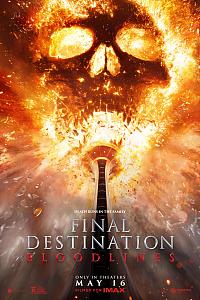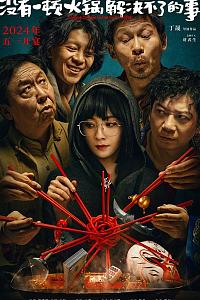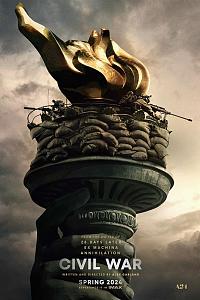
Huaquero
| 导演: | Juan Carlos Donoso Gómez |
| 编剧: | Juan Carlos Donoso Gómez |
| 主演: | Carlos Valencia Tommy Párraga Steven Chang |
| 制片国家/地区: | 厄瓜多尔 / 秘鲁 |
| 类型: | 剧情 |
| 年代: | 2021 |
| 豆瓣评分: | 0 |
| IMDB: | 0 |
| 影伴评分: | 0 |
剧情简介
On the northern coast of Ecuador, on Tolita Island, dozens of Afro-Ecuadorian children gather on the beach to collect Pre-Colombian artifacts that are scattered across the sand. They are all searching through the debris for pieces that they can somehow fix and sell to tourists on the mainland. Washo, a fifty-year-old unemployed fisherman, watches the children at their work whil... (展开全部)
On the northern coast of Ecuador, on Tolita Island, dozens of Afro-Ecuadorian children gather on the beach to collect Pre-Colombian artifacts that are scattered across the sand. They are all searching through the debris for pieces that they can somehow fix and sell to tourists on the mainland. Washo, a fifty-year-old unemployed fisherman, watches the children at their work while he recovers from a hangover. His fractured relationship with his daughter Yessica (6 years old) creates a distance between them. He leaves her with his ex-wife, who is upset with him for his irresponsibility as father. In the tropical heat of the night, Washo tries to fit the pieces of a clay figure back together like a puzzle. The scant catch of the season and the poor sales from his coconut grove only earn him enough to buy a bottle of moonshine and go out to the town's only bar on the makeshift docks, where the lights flicker thanks to the shortage of electricity. The alcohol and the precariousness of his life bring out his violent personality, which ends up permanently damaging his relationship with his daughter's mother. The sound of the waves breaking on the rocks of Isla DE la Plata (Silver Island) merges with the sounds of a boat from which Joselito (60 years old) descends. He is a native of the Ecuadorian coast and is dealing with the disappointment of the huaqueros (tomb raiders) who are complaining about the lack of results; they haven't found anything in the place where he suggested they excavate. Upon returning to the mainland, we can see how Joselito's museum has been destroyed by the recent earthquake. His brother urges him to sell all of his artifacts; thanks to the earthquake they need to rebuild their house and take care of their sick mother. But he refuses, confident that they will be able to find more pieces to sell. Excavating in another rural area of Valdivia, surrounded by a thick dry forest, an unexpected accident traps one of the huaqueros underground, and he suffocates to death. Impacted by the loss and limited by his lack of resources, Joselito sells off everything in his museum to a business magnate in the big city. After the deal is done, in which he practically has to give away his most valuable pieces for a laughable sum, he wanders through the city feeling lost, watching a backhoe digging a giant hole to build a new building. The trees begin to thin out in the arid landscape of Sipán, in northern Peru. Filo (50 year old) is talking to his lawyer who, through great legal maneuvering, has managed to get him out of prison, even though he has refused to admit anything about the robbery of El Señor DE Sipán (The Lord of Sipán), one of the greatest archeological finds in history, at the hands of huaqueros. After his time in prison Filo wanders like a ghost in his own home; his wife and son suffer the beatings of his depression, which has greatly deteriorated his relationship at home. He tries to support his family through his work in the sugarcane fields and in the little field of corn that he has beside the Mochica pyramid, where a great treasure was found years ago. But his efforts are in vain; the sugarcane company withholds his wages and he loses his own farm to an illegal fire. Tempted by necessity, he accepts the invitation of his friend who brings him to raid a tomb, insisting he knows the location of a new Moche treasure. Despite his wife's protests, he brings his son with him. After several hours of fruitless digging, a dozen police officers flood the camp and catch them red-handed. Once at the police station, Filo sees his lawyer again, who looks at him with disappointment when seeing that this time he has gotten his son involved. The desert spills infinitely in front of the ocean. The three giant pyramids of the archeological complex "Huaca del Brujo" (The Sorcerer's Tomb) pose motionless against the landscape. Juan helps his pregnant wife to gather mollusks at low tide. There is tension between them; what they earn will not be enough for what is coming next in their lives. At night Juan tries to catch crabs with his friends, but only manages to gather a few kilos. Roberto, an experienced huaquero from Magdalena DE Cao, Peru, invites Juan to help with a robbery. They walk together, posing as tourists as they examine the artifacts of the Sorcerer's Tomb, exploring its structure and its possible discoveries. At night, they approach the undefended tomb to excavate. But they are greatly surprised when, upon finding the treasure, a sun lights them up completely, turning the night into day. They escape with a few things and upon returning home, Juan finds his wife on the floor, covered in blood. Meanwhile Robert begins to have nightmares thanks to a crown of feathers he has stolen; in the morning, disturbed, he takes his motorbike and rides to the beach. Furiously he pours gasoline on all the loot and sets it on fire. He watches statically as everything burns in front of the ocean. "Huaquero" ventures down the South American coast, unearthing people and places that are apparently unconnected, but united by the precarious activity of selling archaeological artifacts from their ancestral cultures. Beginning in the lush equatorial jungle and ending in the desert landscape of the Peruvian coast, the film explores a masculinity torn apart by the necessity and the insanity of being forced to raid tombs in order to try to get ahead, and failing. The rural mood and its legends of the huaqueros filter throughout all the stories, and through the light that appears to leave them continuously in oblivion. The rawness of the documentation mixes with the fantasy of the mythological and poetic countryside, where it appears that the ancestors still speak of their pain through the holes inflicted on their sacred places, their "huacas" or tombs.
On the northern coast of Ecuador, on Tolita Island, dozens of Afro-Ecuadorian children gather on the beach to collect Pre-Colombian artifacts that are scattered across the sand. They are all searching through the debris for pieces that they can somehow fix and sell to tourists on the mainland. Washo, a fifty-year-old unemployed fisherman, watches the children at their work whil... (展开全部)
On the northern coast of Ecuador, on Tolita Island, dozens of Afro-Ecuadorian children gather on the beach to collect Pre-Colombian artifacts that are scattered across the sand. They are all searching through the debris for pieces that they can somehow fix and sell to tourists on the mainland. Washo, a fifty-year-old unemployed fisherman, watches the children at their work while he recovers from a hangover. His fractured relationship with his daughter Yessica (6 years old) creates a distance between them. He leaves her with his ex-wife, who is upset with him for his irresponsibility as father. In the tropical heat of the night, Washo tries to fit the pieces of a clay figure back together like a puzzle. The scant catch of the season and the poor sales from his coconut grove only earn him enough to buy a bottle of moonshine and go out to the town's only bar on the makeshift docks, where the lights flicker thanks to the shortage of electricity. The alcohol and the precariousness of his life bring out his violent personality, which ends up permanently damaging his relationship with his daughter's mother. The sound of the waves breaking on the rocks of Isla DE la Plata (Silver Island) merges with the sounds of a boat from which Joselito (60 years old) descends. He is a native of the Ecuadorian coast and is dealing with the disappointment of the huaqueros (tomb raiders) who are complaining about the lack of results; they haven't found anything in the place where he suggested they excavate. Upon returning to the mainland, we can see how Joselito's museum has been destroyed by the recent earthquake. His brother urges him to sell all of his artifacts; thanks to the earthquake they need to rebuild their house and take care of their sick mother. But he refuses, confident that they will be able to find more pieces to sell. Excavating in another rural area of Valdivia, surrounded by a thick dry forest, an unexpected accident traps one of the huaqueros underground, and he suffocates to death. Impacted by the loss and limited by his lack of resources, Joselito sells off everything in his museum to a business magnate in the big city. After the deal is done, in which he practically has to give away his most valuable pieces for a laughable sum, he wanders through the city feeling lost, watching a backhoe digging a giant hole to build a new building. The trees begin to thin out in the arid landscape of Sipán, in northern Peru. Filo (50 year old) is talking to his lawyer who, through great legal maneuvering, has managed to get him out of prison, even though he has refused to admit anything about the robbery of El Señor DE Sipán (The Lord of Sipán), one of the greatest archeological finds in history, at the hands of huaqueros. After his time in prison Filo wanders like a ghost in his own home; his wife and son suffer the beatings of his depression, which has greatly deteriorated his relationship at home. He tries to support his family through his work in the sugarcane fields and in the little field of corn that he has beside the Mochica pyramid, where a great treasure was found years ago. But his efforts are in vain; the sugarcane company withholds his wages and he loses his own farm to an illegal fire. Tempted by necessity, he accepts the invitation of his friend who brings him to raid a tomb, insisting he knows the location of a new Moche treasure. Despite his wife's protests, he brings his son with him. After several hours of fruitless digging, a dozen police officers flood the camp and catch them red-handed. Once at the police station, Filo sees his lawyer again, who looks at him with disappointment when seeing that this time he has gotten his son involved. The desert spills infinitely in front of the ocean. The three giant pyramids of the archeological complex "Huaca del Brujo" (The Sorcerer's Tomb) pose motionless against the landscape. Juan helps his pregnant wife to gather mollusks at low tide. There is tension between them; what they earn will not be enough for what is coming next in their lives. At night Juan tries to catch crabs with his friends, but only manages to gather a few kilos. Roberto, an experienced huaquero from Magdalena DE Cao, Peru, invites Juan to help with a robbery. They walk together, posing as tourists as they examine the artifacts of the Sorcerer's Tomb, exploring its structure and its possible discoveries. At night, they approach the undefended tomb to excavate. But they are greatly surprised when, upon finding the treasure, a sun lights them up completely, turning the night into day. They escape with a few things and upon returning home, Juan finds his wife on the floor, covered in blood. Meanwhile Robert begins to have nightmares thanks to a crown of feathers he has stolen; in the morning, disturbed, he takes his motorbike and rides to the beach. Furiously he pours gasoline on all the loot and sets it on fire. He watches statically as everything burns in front of the ocean. "Huaquero" ventures down the South American coast, unearthing people and places that are apparently unconnected, but united by the precarious activity of selling archaeological artifacts from their ancestral cultures. Beginning in the lush equatorial jungle and ending in the desert landscape of the Peruvian coast, the film explores a masculinity torn apart by the necessity and the insanity of being forced to raid tombs in order to try to get ahead, and failing. The rural mood and its legends of the huaqueros filter throughout all the stories, and through the light that appears to leave them continuously in oblivion. The rawness of the documentation mixes with the fantasy of the mythological and poetic countryside, where it appears that the ancestors still speak of their pain through the holes inflicted on their sacred places, their "huacas" or tombs.




